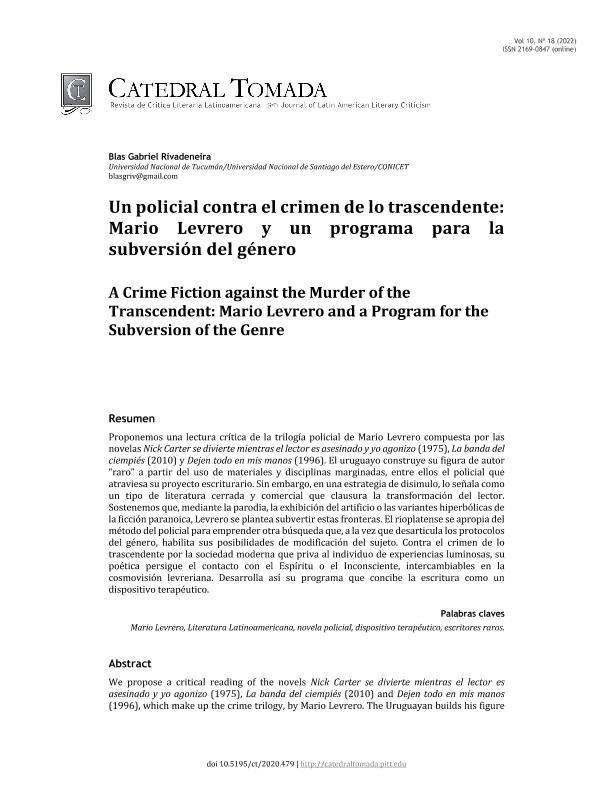Mostrar el registro sencillo del ítem
dc.contributor.author
Rivadeneira, Blas Gabriel

dc.date.available
2023-08-01T14:07:07Z
dc.date.issued
2022-07
dc.identifier.citation
Rivadeneira, Blas Gabriel; Un policial contrael crimen de lo trascendente: Mario Levrero y un programa para la subversión del género; University of Pittsburgh; Catedral Tomada; 10; 15; 7-2022; 35-61
dc.identifier.uri
http://hdl.handle.net/11336/206322
dc.description.abstract
Proponemos una lectura crítica de la trilogía policial de Mario Levrero compuesta por las novelas Nick Carter se divierte mientras el lector es asesinado y yo agonizo (1975), La banda del ciempiés (2010) y Dejen todo en mis manos (1996). El uruguayo construye su figura de autor raro a partir del uso de materiales y disciplinas marginadas, entre ellos el policial que atraviesa su proyecto escriturario. Sin embargo, en una estrategia de disimulo, lo señala como un tipo de literatura cerrada y comercial que clausura la transformación del lector. Sostenemos que, mediante la parodia, la exhibición del artificio o las variantes hiperbólicas de la ficción paranoica, Levrero se plantea subvertir estas fronteras. El rioplatense se apropia del método del policial para emprender otra búsqueda que, a la vez que desarticula los protocolos del género, habilita sus posibilidades de modificación del sujeto. Contra el crimen de lo trascendente por la sociedad moderna que priva al individuo de experiencias luminosas, su poética persigue el contacto con el Espíritu o el Inconsciente, intercambiables en la cosmovisión levreriana. Desarrolla así su programa que concibe la escritura como un dispositivo terapéutico.
dc.description.abstract
We propose a critical reading of the novels Nick Carter se divierte mientras el lector es asesinado y yo agonizo (1975), La banda del ciempiés (2010) and Dejen todo en mis manos (1996), which make up the crime trilogy, by Mario Levrero. The Uruguayan builds his figure as a "rare" author from the use of marginalized materials and disciplines, among them, the crime fiction that goes through his writing project. However, in a strategy of dissimulation, he points out it as a type of closed and commercial literature that closes the transformation of the reader. We argue that, through parody, display of artifice, or hyperbolic variants of paranoid fiction, Levrero sets out to subvert these boundaries. The writer appropriates the crime novel to develop another search which, while dismantling the protocols of the genre, enables its possibilities of modifying the subject. Against the crime of the transcendent by modern society that deprives the subject of luminous experiences, his poetics pursues contact with the Spirit or the Unconscious, interchangeable in his worldview. He thus manifests his program that conceives writing as a therapeutic device.
dc.format
application/pdf
dc.language.iso
spa
dc.publisher
University of Pittsburgh
dc.rights
info:eu-repo/semantics/openAccess
dc.rights.uri
https://creativecommons.org/licenses/by-nc-sa/2.5/ar/
dc.subject
MARIO LEVRERO
dc.subject
LITERATURA LATINOAMERICANA
dc.subject
NOVELA POLICIAL
dc.subject
DISPOSITIVO TERAPÉUTICO
dc.subject.classification
Literaturas Específicas

dc.subject.classification
Lengua y Literatura

dc.subject.classification
HUMANIDADES

dc.title
Un policial contrael crimen de lo trascendente: Mario Levrero y un programa para la subversión del género
dc.title
A crime fiction against the murder of the transcendent: Mario Levrero and a programfor the subversion of the genre
dc.type
info:eu-repo/semantics/article
dc.type
info:ar-repo/semantics/artículo
dc.type
info:eu-repo/semantics/publishedVersion
dc.date.updated
2023-07-07T21:56:30Z
dc.identifier.eissn
2169-0847
dc.journal.volume
10
dc.journal.number
15
dc.journal.pagination
35-61
dc.journal.pais
Estados Unidos

dc.journal.ciudad
Pittsburgh
dc.description.fil
Fil: Rivadeneira, Blas Gabriel. Consejo Nacional de Investigaciones Científicas y Técnicas. Centro Científico Tecnológico Conicet - Tucumán. Instituto de Investigaciones sobre el Lenguaje y la Cultura. Universidad Nacional de Tucumán. Facultad de Filosofía y Letras. Cátedra de Literatura Argentina. Instituto de Investigaciones sobre el Lenguaje y la Cultura; Argentina
dc.journal.title
Catedral Tomada
dc.relation.alternativeid
info:eu-repo/semantics/altIdentifier/url/https://catedraltomada.pitt.edu/ojs/index.php/catedraltomada/article/view/544
dc.relation.alternativeid
info:eu-repo/semantics/altIdentifier/doi/http://dx.doi.org/10.5195/ct/2020.479
Archivos asociados
